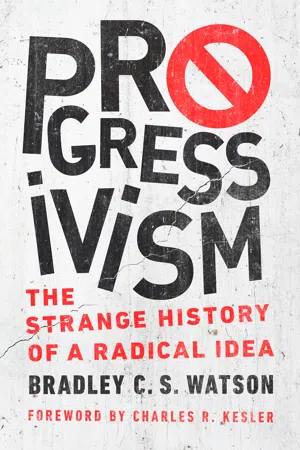![]()
Notes
Foreword
1. The Federalist Papers, ed. Charles R. Kesler (New York: Signet Classic, 2003), No. 49, pp. 311–12.
2. The Federalist Papers, No. 51, p. 319.
3. Abraham Lincoln, Letter to Henry L. Pierce and Others, April 6, 1859, in Selected Speeches and Writings by Abraham Lincoln (New York: Vintage Books/Library of America, 1992), p. 216.
4. Herbert Croly, The Promise of American Life (New York: Macmillan, 1909).
Introduction
1. On the wax and wane of the idea of objectivity among historians, see Peter Novick, That Noble Dream: The “Objectivity Question” and the American Historical Profession (New York: Cambridge University Press, 1988). This is a subject to which I shall return in the final chapter.
2. Scholars who have been at the forefront of this reconsideration include James W. Ceaser, Nature and History in American Political Development (Cambridge, MA: Harvard University Press, 2008); Charles R. Kesler, I Am the Change: Barack Obama and the Crisis of Liberalism (New York: Broadside Books, 2012); John Marini and Ken Masugi, eds., The Progressive Revolution in Politics and Political Science (Lanham, MD: Rowman and Littlefield, 2005); Sidney Milkis, Theodore Roosevelt, the Progressive Party, and the Transformation of American Democracy (Lawrence: University Press of Kansas, 2009); Ronald J. Pestritto, Woodrow Wilson and the Roots of Modern Liberalism (Lanham, MD: Rowman and Littlefield, 2005); Jean Yarbrough, Theodore Roosevelt and the American Political Tradition (Lawrence: University Press of Kansas, 2014); and Bradley C. S. Watson, ed., Progressive Challenges to the American Constitution: A New Republic (New York: Cambridge University Press, 2017). The latter volume includes contributions from most of the aforementioned scholars as well as Eric R. Claeys, Wilfred M. McClay, Johnathan O’Neill, William Schambra, and James R. Stoner.
3. Bradley C. S. Watson, Living Constitution, Dying Faith: Progressivism and the New Science of Jurisprudence (Wilmington, DE: ISI Books, 2009).
4. See Julian E. Zelizer, Governing America: The Revival of Political History (Princeton, NJ: Princeton University Press, 2012), 1–4.
5. Zelizer, Governing America, 96.
6. See, for example, Joseph Postell, Bureaucracy in America: The Administrative State’s Challenge to Constitutional Government (Columbia: University of Missouri Press, 2017).
7. Readers interested in such an account might start with Thomas G. West, The Political Theory of the American Founding: Natural Rights, Public Policy, and the Moral Conditions of Freedom (New York: Cambridge University Press, 2017).
ONEThe Revolt against the Constitution
1. Charles R. Kesler, I Am the Change: Barack Obama and the Crisis of Liberalism (New York: Broadside Books, 2012), 35.
2. Richard Hofstadter, Social Darwinism in American Thought, rev. ed. (1944; repr., Boston: Beacon Press, 1955), 125.
3. Morton G. White, Social Thought in America: The Revolt against Formalism (New York: Viking Press, 1949), 241–46.
4. Kesler, I Am the Change, 33. This argument is central to the recent critical scholarship on progressivism to which I referred in my Introduction. See also Ronald J. Pestritto, Woodrow Wilson and the Roots of Modern Liberalism (Lanham, MD: Rowman and Littlefield, 2005).
5. Kesler, I Am the Change, 49.
6. Woodrow Wilson, “The Study of Administration,” Political Science Quarterly 2, no. 2 (June 1887): 215.
7. Herman Belz, “The Constitution in the Gilded Age: The Beginnings of Constitutional Realism in American Scholarship,” American Journal of Legal History 13, no. 2 (April 1969): 111.
8. Hofstadter, Social Darwinism, 4. The phrase social Darwinism gained widespread intellectual currency as an appropriate descriptor of an amalgam of ideas only with the publication of the first edition of this book in 1944.
9. John Dewey, “The Influence of Darwinism on Philosophy,” in The Influence of Darwinism on Philosophy and Other Essays in Contemporary Thought (New York: Henry Holt, 1951). Subsequent page citations to this work are given parenthetically in the text.
10. The only other contender for the throne was the vigorous, pragmatic individualist frontier strain of thought associated with such figures as Frederick Jackson Turner and Mark Twain. But this strain, even in the explicitly progressive iterations of Turner, was never as theoretically unified as social Darwinism, and it never unified the intellectual classes in quite the same manner. Not coincidentally, it could not undermine so directly or consistently the principled understanding of the American founding articulated by Lincoln. Nevertheless, Turner’s frontier thesis attracted a good deal of attention from historians of progressivism, as I detail later.
11. There are problems with this Deweyan tendency to identify nature as final cause or form with changelessness. Such an account comes close to capturing the essence of Plato’s forms, but for Aristotle there are no fixed, immutable ideas separate from matter. Rather, things develop to their natural perfection, which for human beings is happiness, relying on a combination of intellectual and moral virtue. There is a tension in Aristotle between philosophy (man as knower) and politics (man being a political animal, i.e., a virtuous actor, rather than, or in addition to, a knower). It is far from clear, in either Aristotle or Plato, how these virtues interact at all levels. But what is clear is that there is no simple teleology in Aristotle when it comes to human beings. Simple teleologies are for the lower forms, whereas for humans there are choices involving politics, ethics, and philosophy, and nature many times misses its mark. Furthermore, for Aristotle, essence is not form simply, but activity or what a thing does. In his science, repose does not represent the highest state of being. Although there is a good amount of truth to Dewey’s characterization of Western science, or philosophy, as the search for the transcendent, he seems wrong insofar as he puts a Platonic gloss on Ari...
